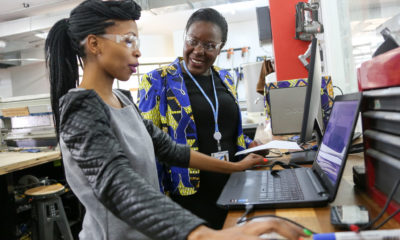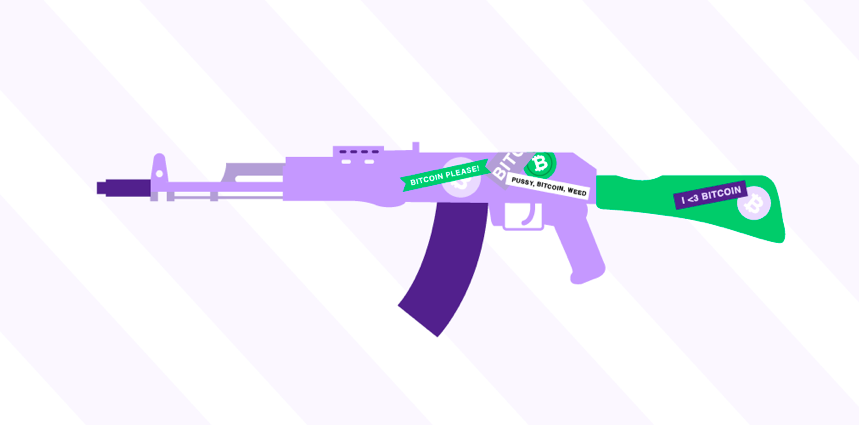Bitcoin
The State of Bitcoin in Kenya
Published
6 years agoon
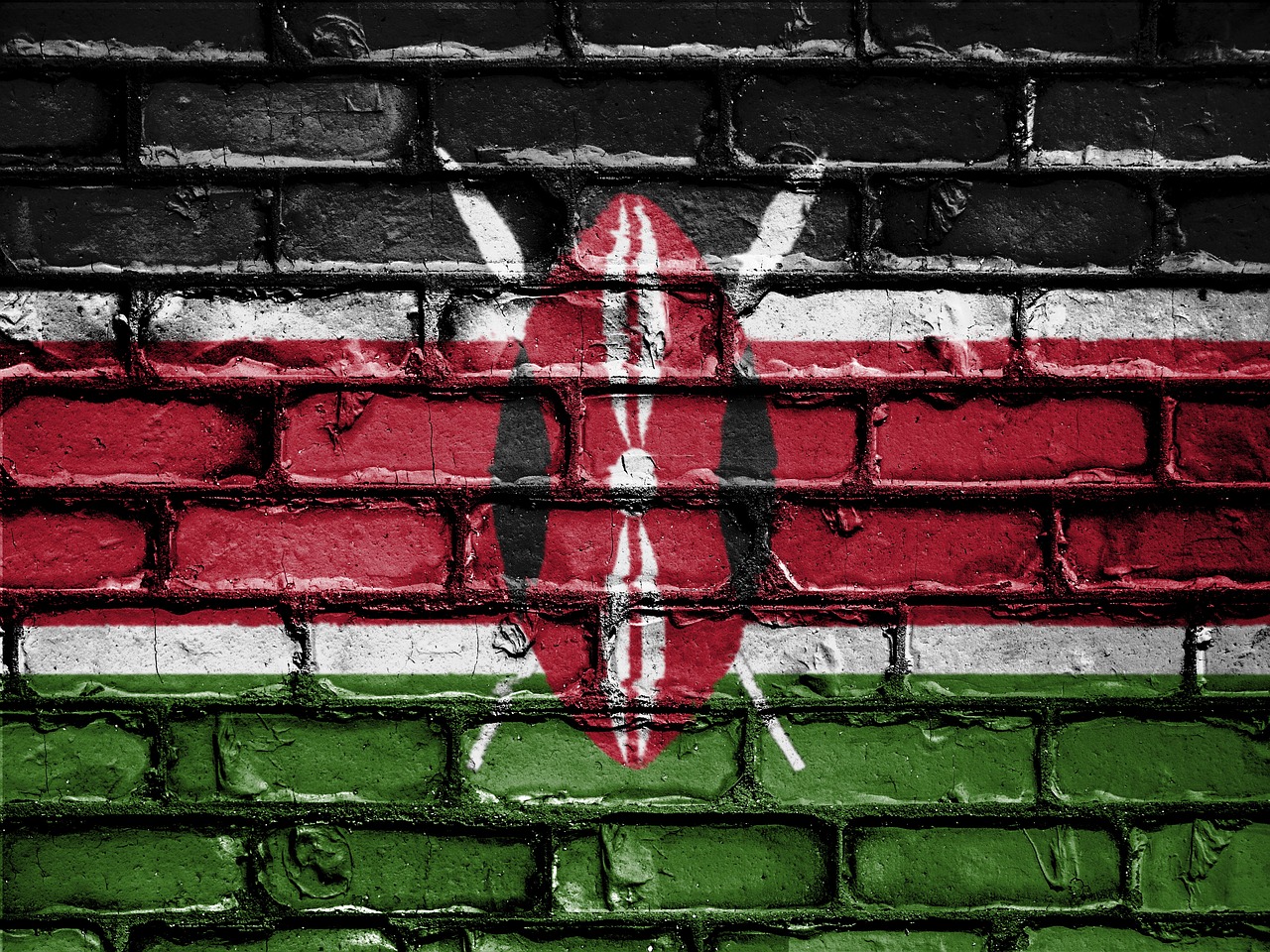
Since the early days of bitcoin, many believed that the digital currency would end up banking the unbanked in developing regions such as Africa. While bitcoin adoption in Africa has made some commendable steps forward, its use as a payment method is yet to have a far-reaching impact. Despite this, the African continent has seen the establishment of some well-known bitcoin economies of which Kenya is one of the most prominent.
In this article, you will gain an insight into the state of bitcoin in Kenya and learn about the challenges that bicoin startups are facing in this East African economic hub.
The Bitcoin Ecosystem in Kenya
Kenya is one of the African nations where bitcoin use has continued to gain significant momentum, which has led to the development of a thriving local bitcoin economy.
As more African countries awaken to the adoption of bitcoin, only Kenya, Nigeria, Ghana, and South Africa provide promising bitcoin ecosystems that incorporate bitcoin liquidity, local bitcoin communities, startups, and meetups.
Kenya’s bitcoin ecosystem boasts regular meetups, a co-working space and accelerator focused on blockchain technology, is home to several bitcoin startups and exchanges, is experiencing an increasing demand for bitcoin and a community that’s well-versed in mobile money usage.
BitPesa – Kenya’s Leading Bitcoin Startup
There would be no talk of bitcoin in Kenya without the mention of BitPesa, its leading local bitcoin startup. Nairobi-based BitPesa was launched in 2013 with the aim to provide businesses and individuals with a cheaper alternative of making international payments to and from Africa by leveraging bitcoin as a payment method. The use of bitcoin has enabled BitPesa to lower payment costs in and out of Africa by 50 percent.

With over 17,000 transactions and more than 6,000 users, BitPesa’s current operations are in Kenya, Tanzania, Nigeria, Senegal, Democratic Republic of Congo, Uganda, and the United Kingdom. The payment platform allows businesses to process payments in over 30 currencies across borders.
Initially, BitPesa started its operations targeting private individuals who were looking for alternative means of remitting money. However, they have since changed their model and have started to offer their services to businesses. Changing their model to focus on B2B clients and enabling them to make cross-border transactions has not only seen their expansion into other African markets but has continued to shape the BitPesa success journey enabling it to raise further funding in 2017.
Despite the strong growth of BitPesa’s trading volumes in Africa, however, it has been forced to seize KES payments due to the pushback of the Kenyan central bank against bitcoin and bitcoin-related startups in September 2017. Unfortunately, BitPesa is not the only bitcoin startup facing difficulties when it comes to banking in Kenya due to the central bank’s very clear negative stance on the digital currency.
Central Bank of Kenya’s View on Bitcoin
Following an embroiled court case between BitPesa and Safaricom – Kenya’s largest telecommunication network – in December 2015, a statement warning the public about the use of bitcoin was issued by the Central Bank of Kenya (CBK) across various newspapers. In part, the warning stated:
“virtual currencies such as bitcoin are not legal tender in Kenya and therefore no legal protection exists in the event that the platform that exchanges or hold the virtual currency fails or goes out of business…”
In the eyes of the CBK, the anonymous nature of bitcoin payments makes it, “…susceptible to abuse by criminals in money laundering and terrorism financing”.
Following this directive by the CBK, no known directive or clarity has been offered on the use of bitcoin or on any other form of digital currency.
However, it has become known that the Central Bank of Kenya has communicated to local banks not to perform any business whatsoever with bitcoin startups. Following this communication, several bitcoin startups such as BitPesa had their bank accounts shut down. This, of course, poses a challenge to new and existing bitcoin startups who want to operate in the country.
Kenya’s Blockchain Hub
The opening of a blockchain-focused startup incubator and co-working space by BitHub.Africa in 2016 in Nairobi made Kenya the first of a kind in the East African Community to house one.

BitHub.Africa has a co-working space, an accelerator for startups that are interested in creating blockchain solutions, and provides consulting and advisory services for organisations that are interested in blockchain technology.
Blockchain Technology in Kenya
Unlike bitcoin, blockchain technology is very welcome in East Africa’s largest economy. As BitcoinAfrica.io reported on September 14, several industries in Kenya are implemented blockchain solutions to improve their services.
The National Transport and Safety Authority (NTSA) announced that it will be mandatory for Kenyan vehicles to have electronic stickers. The electronic motor identification service will ensure that all drivers have the stickers on the windscreens of their cars and will be detected by use of special gadgets. This move will help in the recovery of stolen vehicles and rid Kenya of unsafe old cars. The service will operate on a shared blockchain platform that will link key state agencies like the Kenya Police and the Kenya Revenue Authority together.
Furthermore, Kenya’s health sector will make use of blockchain technology through the installation of a smart platform that will enable all public hospitals to monitor important patient data such as a patient’s health history as well as for the use of public health and hospital management.
In the insurance sector, America Insurance Group (AIG) has partnered with banking group Standard Chartered to launch a pilot using blockchain technology where it ran cover offers for their policyholders across America, Kenya, and Singapore. The pilot saw the two companies process real-time payments for their clients on a unified blockchain-powered platform that linked their agents and financial institutions.
Needless to say, industry in Kenya is discovering the benefits of blockchain technology for itself and many more applications using the distributed ledger technology are expected to follow.
Bitcoin Adoption in Kenya
One of the major setbacks bitcoin adoption has faced in Africa is the high cost of the Internet and a lack of Internet connectivity. As it stands, Internet penetration in Africa is at 18 percent, which is substantially lower than the acceptable global average rate of 30 percent. Many rural areas in some African nations are quite distant from cable stations making Internet connectivity expensive and inefficient.
Besides being one of the two countries in Sub-Saharan Africa with leading telecommunication development, Kenya’s Internet penetration stands at 66 percent which is the highest in Africa. This has made Nairobi – the capital of Kenya – a hub for many tech startups and is famously known as Silicon Savannah. Moreover, in Africa, according to data from McKinsey, Kenya leads in the adoption and use of mobile payment with 86 percent of houses having active mobile money accounts.
While these elements make Kenya a conducive environment for bitcoin startups, there are a handful of entrepreneurs that have adopted the use of bitcoin in providing solutions in the region. Besides BitHub.Africa and BitPesa, Umati Blockchain, BitSoko, Belfrics Kenya, and Remitano are other startups that are making use of bitcoin in Kenya.

According to several members of the bitcoin community in Nairobi, bitcoin use is prevalent among the youthful tech-savvy generation who receive bitcoin payments for their freelance work or are buying them for investment purposes.
The Future of Bitcoin in Kenya
With a bitcoin-unfriendly central bank, international bitcoin startups are finding it hard to break into the Kenyan market and homegrown startups are struggling to get off the ground. Nonetheless, bitcoin adoption is on the rise in Kenya as can be witnessed by trading volumes on LocalBitcoins. Even the national media has been reporting about bitcoin, which has boosted bitcoin awareness in the East African nation.
Should the Central Bank of Kenya change its view on the use of cryptocurrencies, Kenya would have the potential to become a leading global bitcoin economy as the country benefits from a well-educated driven young generation of entrepreneurs and developers in Nairobi’s Silicon Savannah who are very capable of developing new bitcoin and blockchain business solutions if they were to receive the regulatory stamp of approval and support from local authorities.
You may like
-
Weekly Roundup: Kenyan Senate in Discussion with CBK to Legalise Bitcoin & More
-
Weekly Roundup: Morocco’s Central Bank Announces Completion of Draft Cryptocurrency Regulatory Framework & More
-
Weekly Roundup: South African Crypto Exchange VALR Launches in Zambia & More
-
Weekly Roundup: Kenya’s Capital Markets Bill 2022 Seeks to Tax Crypto Transactions & More
-
Get Lucky Tickets for World Cup Bets on 1xBit
-
Weekly Roundup: First Cohort of African Women Graduate from Binance Blockchain Bootcamp & More
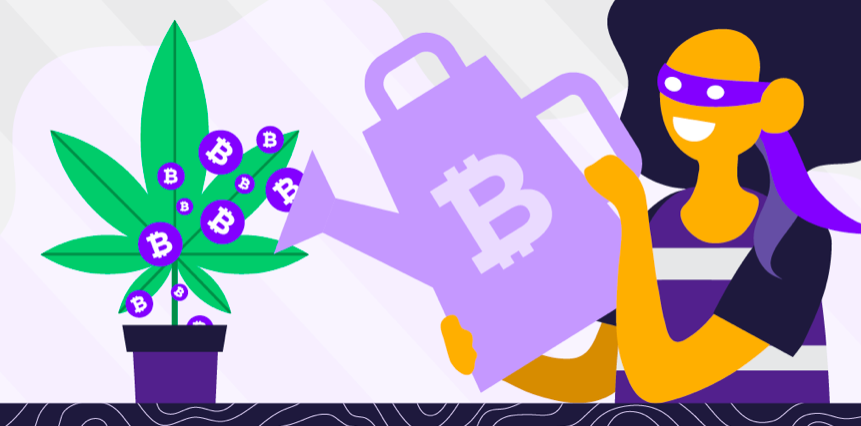
Statistics, examples, and ways to legally use cryptocurrency
October 1, 2013, was a turbulent day for San Francisco Public Library. A dozen FBI agents pretending to be usual visitors surrounded a man sitting at one of the tables, took his laptop and put a pair of handcuffs on his hands. That man was Ross Ulbricht, founder of Silk Road – the largest darknet marketplace for drug dealers, killers, and other criminals. The seizure of Ulbricht was supposed to tackle the illegal online trade, but, as the news site DeepDotWeb wrote, the bust was “the best advertising the darknet markets could have hoped for”. The reputation of cryptocurrency also suffers from associations with terrorists, who sometimes use it for their needs. How big is the real scale of the problem? And how many legal ways to use crypto exist? ChangeNOW has dived into the topic – and suggests you an overview of the current state of the problem.
Highlights:
- The drugs trade volume using cryptocurrency is relatively large
- Crypto was a significant reason why a part of drug sales migrated to the web, though stays yet not viable and anonymous enough for dealers (same as for terrorists)
- As efficient use of blockchain technology requires good infrastructure, crypto remains not suitable enough for many terrorist groups
- However, some terrorists are trying to adjust to anonymity threats and hold fundraising in crypto
- Legal ways to use cryptocurrency include dozens and vary from IT services to car rentals
Crypto & Drugs & Rock’n’Roll
The total volume of the online drug market using cryptocurrency is around $1 billion. It is located in the darknet, which provides an attractive, profitable, and mostly secure environment for drug dealers. Cryptocurrency, in turn, allows making payments that are hard to be tracked by authorities. This is how blockchain technology has helped to bring a big part of drug sales online from the streets. And it’s not only about drugs themselves – many legal opioid drugs are illegally sold here, too.
However, cryptocurrency is not always as secure and anonymous as it is thought to be. The information about any transaction ever made stays forever in the blockchain, which makes the system way more transparent than cash payments. This is a significant limitation for using crypto in illegal purposes.
According to the University of Technology Sydney, about 46% of criminal activity of each year is connected to Bitcoin. As for the drug sale itself, trade volumes in crypto keep rising, but the percent of Bitcoin drug transactions out of all transactions goes down. This means Bitcoin is more frequently used for legitimate purposes.
What cryptocurrency is used for drug sales most often? Surprisingly, privacy coins such as Monero are used only for 4% of transactions. Due to its pioneer position, Bitcoin is used in 76% of all deals despite all its anonymity risks.
The main problem for drug dealers using crypto is to turn their income into cash. This move remains complicated and insecure. Most cryptocurrency exchanges have instruments to define whether a transaction is coming from a suspicious source like the darknet. The rise of Monero use in the online drug market will hinder such tracking. However, for the reasons listed above, crypto is unlikely to completely replace regular cash in drug sales in the foreseeable future.
Cryptoterrorism
The views on how much cryptocurrency is used and will be used by terrorists vary widely. While some claim that terrorists have no infrastructure to use it and the methods are not secure enough, others argue that they are learning fast and adjust to crypto rapidly. Let’s see what both sides say.
Not actively using, unclear future
Lack of appropriate infrastructure, inability to use crypto. Most terrorist groups settle in the Middle East region, especially on its remote and war-torn territories. The vast majority of roads and technological infrastructure have been destroyed. In such circumstances, cash remains the most common and convenient way to pay and fundraise. Imagine a gun seller in a Syrian village – does it look like he has a tool to accept Monero?
Anonymity threats. Given the relative transparency of blockchain mentioned above, crypto might remain too unsafe for terrorists. Miners can see any potential terrorist money exchange while checking transactions, and it’s not too hard to see who sends them money. It can change with the rising use rate of privacy coins, but the ability to spend such money remains questionable.
Increased attention to crypto by the authorities. As the number of transactions keeps rising, more regulatory bodies’ attention gets focused on cryptocurrency, which apparently makes terrorists nervous and cautious.
Problems of specific currencies. While top cryptocurrencies like Bitcoin receive much regulatory attention, others remain marginal and unreliable because of a lack of support. Conflicts and uncertainty lower the trust to such cryptocurrencies – yes, even terrorists’ trust.
Using actively now, increasingly in the future
Terrorists seem to be rapidly learning to escape from tracking in blockchain. Several years ago it was easy to find any address or transaction made for a terrorists’ fundraiser. Today they use well organized and finely designed websites, where detailed video tutorials show how to donate money anonymously. Unique Bitcoin addresses and other crypto tricks are used to preserve security. Analysts from intelligence services claim there’s only going to be more such cases. And, of course, privacy coins are a “great opportunity” for terrorists too.
Shift to cryptocurrency is a reaction to economic sanctions. ISIS has lost most of its territory and resources, Hamas has been sanctioned by the West. Having been cut off from all main financial institutes, terrorist groups had to find other pathways for their financial activities – and cryptocurrency appeared to be the best substitute.
There might be difficulties and inconveniences, and the number of terrorists using crypto is yet unknown – but as we can see, digital money in terrorism is reality. Same as in drugs. And this is what cryptocurrency is notorious for, lacking trust among millions of people. The reputation of some of the exchange services only adds to this mistrust – ChangeNOW has carried out a special investigation on how such platforms may cheat their clients. But can you buy anything besides heroin and firearms with your crypto? What about pizza or a concert ticket?
Only Antarctica left
Cryptwerk, a platform monitoring actual use cases of different cryptocurrencies, says there are about 3500 ways to spend Bitcoin and more than 800 for Monero today. They range from music services to car rentals, from buying clothes to hotel booking services, and from sports bets to virtual tours.
Organizations accepting cryptocurrency are located on all continents besides Antarctica (what could be a better place for crypto than a continent without governments and countries though?). Mostly, in the USA and Central Europe. Bitcoin as the largest cryptocurrency is relatively widespread in India and Southeast Asia.
As this is a whole another topic, ChangeNOW will issue a post dedicated to use cases of cryptocurrencies. As it will be more detailed, who knows – maybe you’ll find a pizza right by that you could pay for from your crypto wallet!
This article was contributed by Jeremy from ChangeNow.
Bitcoin
Buroka Review: How to Buy Bitcoin on Nigeria’s Newest Bitcoin Exchange
Published
3 years agoon
February 27, 2020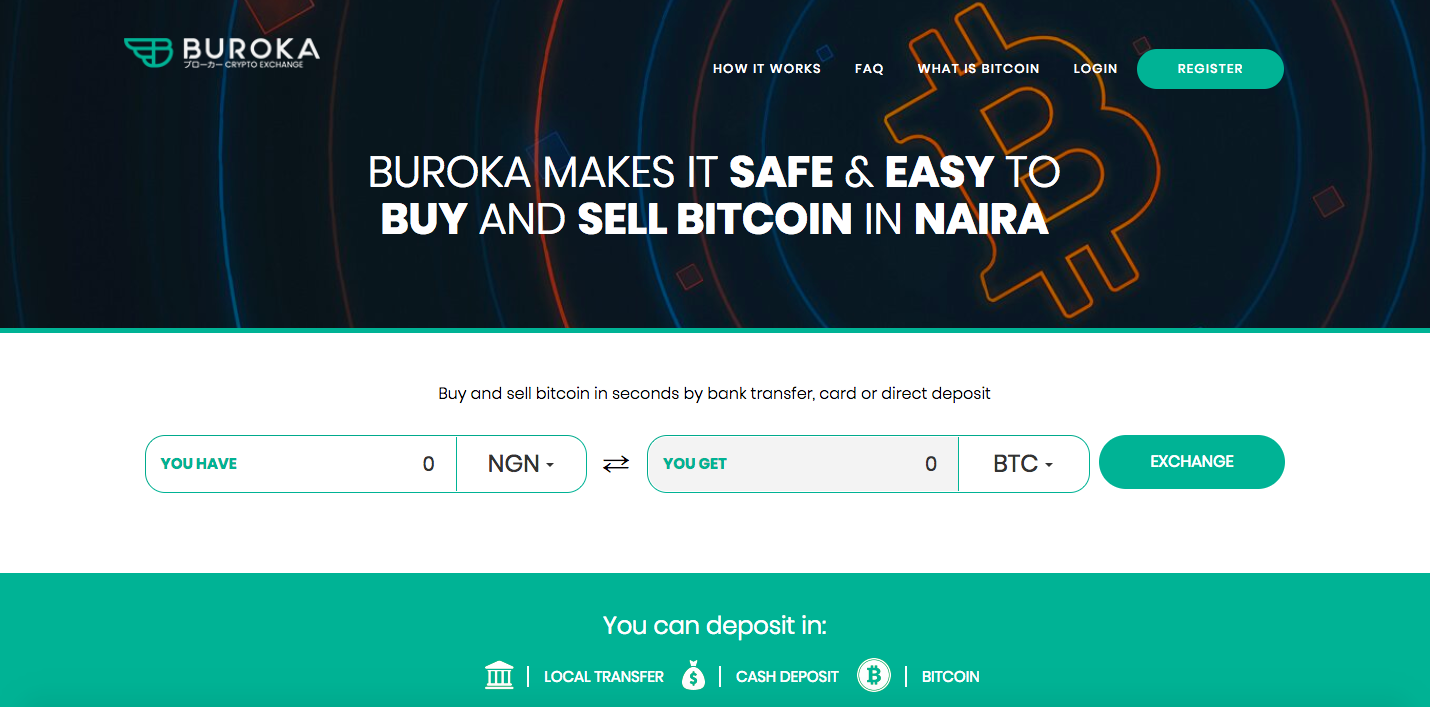
Buroka is a new breed of cryptocurrency exchange for Africa! Currently operating in Nigeria, Buroka was designed to fulfill the needs of modern Africans. Buroka allows customers to buy and sell Bitcoin with Naira via Local Transfers and cash deposits at the bank. In this Buroka review, you will learn more about the exchange and how you can use it to buy bitcoin in Nigeria.
How to Buy Bitcoin on Buroka
Step 1: Account Creation
To create an account, visit Buroka.com and hit the “Register” button. This will lead you to a page where you will be asked to fill in your personal information, including your name, email address, and password. Like any other serious exchange, Boruka will ask you for your ID, Proof of Address, and to take a selfie with your ID to eliminate fraud.
Step 2: Fund Your Account
Funding your account on the platform is straightforward. You can deposit either via bank transfer or at any bank branch. Make sure to use a unique reference code given to you by Buroka deposit system.
Step 3: Buying and Selling BTC
Once your deposit has been credited to your account you can immediately buy your Bitcoin. The buying and selling tab is located on the top right corner of the dashboard. There you can input the amount of bitcoin you want to buy. Once you do that, you then click on the “BUY BTC” button.
Step 4: Storing Your BTC
After buying BTC, Buroka provides users with the option of either storing bitcoin on the platform in a BitGo wallet or any other wallet of their choice.
Currently, Buroka only supports bitcoin (BTC). However, the exchange plans to include other cryptocurrencies going forward.
Security
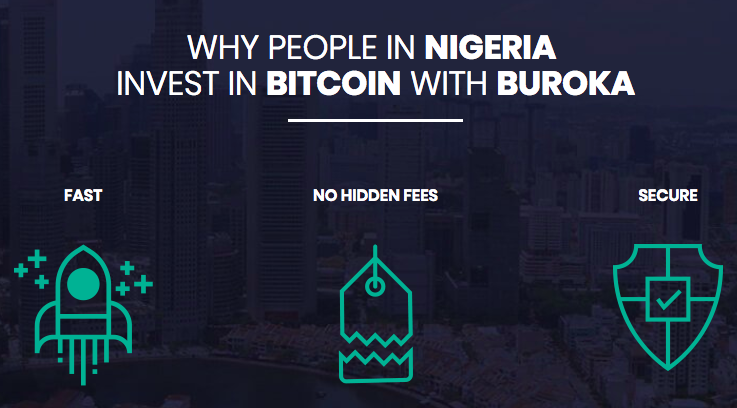
In addition, Buroka’s platform is also protected using the latest security technology, including web-socket and API protocols that allow for a fast and secure order processing. Buroka also makes use of a well-updated SSL certificate, which makes it easy to detect a phishing attempt.
To further ensure that clients’ funds are secure, Buroka operates segregated accounts. These accounts are held with trusted banks so that clients can enjoy an extra layer of security provided by the banking system.
Conclusion
Buroka is a relatively new Bitcoin exchange with a well-designed, user-friendly interface. The Bitcoin trading platform provides several deposit options, which is attractive for Nigerian Bitcoin traders, as well as competitive market rates for both buyers and sellers.
If you are looking to buy or sell bitcoin in Nigeria, you can give Buroka a try.
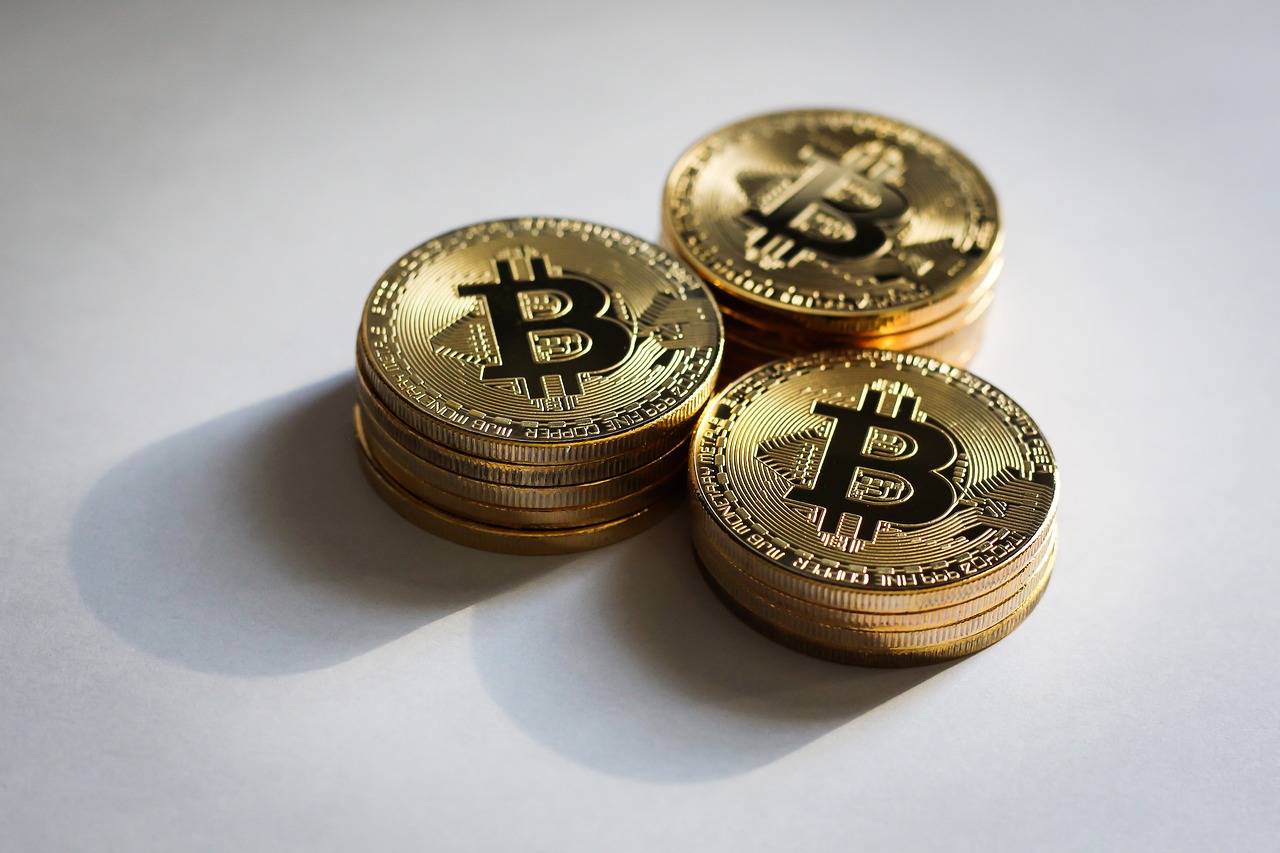
Bitcoin is not as anonymous as people think. Bitcoin transactions are viewable on the network’s public blockchain, which also means that transactions can be linked to real-world identities. As a result, bitcoin is not (yet) fungible and does not protect individuals’ financial sovereignty as much as it should. Fortunately, there is something called a bitcoin mixer that enables bitcoin users to increase their financial privacy.
In this guide, you will learn what bitcoin mixers are and why you should consider using them.
How Anonymous Are Regular Bitcoin Transactions?
Regular bitcoin transactions are not anonymous. Bitcoin addresses are pseudonymous. They do not reveal your identity as a user but can be linked to your identity.
For instance, most exchanges require you to verify your identity with legal identification (ID) documents. In a situation where you withdraw funds from an exchange into your wallet, your identity can be linked to that wallet, and all your linked transactions could be tracked.
Blockchain analysis companies can use information from your linkable transactions to track how many bitcoins you own, what you spend your coins on, and who you transact with. If you are conscious about your privacy, you might need a bitcoin mixer.
What is a Bitcoin Mixer?
A bitcoin mixer allows you to mix your coins with other users. This obscures the ties between your personal identity and bitcoin transactions.
The end goal of a bitcoin mixing service is to create a misleading trail of transactions that makes it difficult to track your transactions. This is achieved by breaking down your bitcoin into smaller parts and then mixing them with coins from other transactions.
Most bitcoin mixers are non-custodial, run on the Tor network, and do not keep records of users after a couple of hours.
Why Do People Use Bitcoin Mixers?
The primary reason for using a bitcoin mixer is to increase transactional privacy. You may not want “the whole world” to be able to see what you are doing with your bitcoin. Through the use of a mixing service, you can achieve that despite Bitcoin’s public blockchain.
Moreover, there are a number of other reasons why you should consider using a bitcoin mixer. They include:
Your Transactions Reveal Personal Finance Information
Every time you send bitcoin to or receive bitcoin from an individual, the other party gains some information about your bitcoin holdings.
For example, if you have ten bitcoin in your wallet and you send two to another person. The individual who received the bitcoin now has access to your bitcoin address, which allows them to check your balance on the blockchain.
In some cases, by analyzing your inputs and outputs, they can predict other addresses you own, giving them more information about your finances and transactions you have done in the past. Mixers can prevent this. The mixer breaks the connection between addresses in your wallet by creating transactions that make it difficult for blockchain analysts to track.
Based on the example above, if you use a coin mixing service to send out the coins, the receiver can still check the blockchain to verify the transaction but will be unable to track your old transactions and find your bitcoin address.
Blockchain Analysis Companies Are Watching
Over the years, blockchain analysis companies have been established to track transactions and monitor the Bitcoin blockchain. These groups have resources to probe deeper into transactions, with some going as far as connecting IP addresses to bitcoin transactions.
Further, cryptocurrency exchange verification is required by regulators to keep an eye on how individuals use their bitcoin. This means that exchanges can still trace your transactions after you have purchased bitcoin.
Bitcoin mixers allow you to detach connections between your initial receiving address and other transactions you make. This can prevent companies from gathering data about you, which it would otherwise share with (or sell to) third parties.
To Prevent Censorship
Money has become a tool used to fund political groups and operations. In authoritarian regimes, where the financial system is highly monitored by the ruling government, critics or opposition groups may opt for bitcoin.
To ensure complete privacy while using bitcoin, such groups will require bitcoin mixing platforms. Without increased transaction privacy, these groups risk losing support in situations where the state begins to target individuals funding them by tracking their transactions on the blockchain.
This allows bitcoin to be used as a tool for freedom of speech and expression.
If you want to mix your coins to protect your financial sovereignty as a bitcoin user, check out Bitcoin Mixer.

How Mobile Apps are Changing Sports Betting

Weekly Roundup: Africa’s Cassava Network Partners with UniPass to Expand Crypto Adoption in Africa & More

Weekly Roundup: Kenyan Senate in Discussion with CBK to Legalise Bitcoin & More

Weekly Roundup: South Africa Introduces New Cryptocurrency Standards to Advertising Code & More

ND Labs Launches Crypto Exchange Software Development

Weekly Roundup: African Web3 Mobile Games Publisher Carry 1st Secures $27M in Funding & More

Weekly Roundup: Morocco’s Central Bank Announces Completion of Draft Cryptocurrency Regulatory Framework & More

Weekly Roundup: Nigeria Looking to Legalise Cryptocurrency Usage, CAR’s Sango Coin Postponed & More

Weekly Roundup: South African Crypto Exchange VALR Launches in Zambia & More

Weekly Roundup: Kenya’s Capital Markets Bill 2022 Seeks to Tax Crypto Transactions & More
Popular Posts
-
Features2 years ago
What Happened to “Bitconnect Guy” Carlos Matos?
-
Press Releases3 years ago
Sikix Exchange Launches with MoonPay as a Payments Partner
-
Sponsored Posts3 years ago
How to Make Profit Selling Bitcoin in South Africa During 2020
-
Sponsored Posts3 years ago
UMI Blockchain Ecosystem: Instant Transfers, Smart Contracts, and Profitable Staking
-
Guides3 years ago
How to Trade Cryptocurrency on Sikix.io
-
Features3 years ago
RESIST! How Activists Can Use Bitcoin
-
News3 years ago
Weekly Roundup: Bitcoin Hits New All-Time High, Expert Predicts Africa is the Future of DeFi
-
News3 years ago
Weekly Roundup: Binance Uganda to Close Up Shop, Gifts Cards “Moon” on Paxful






